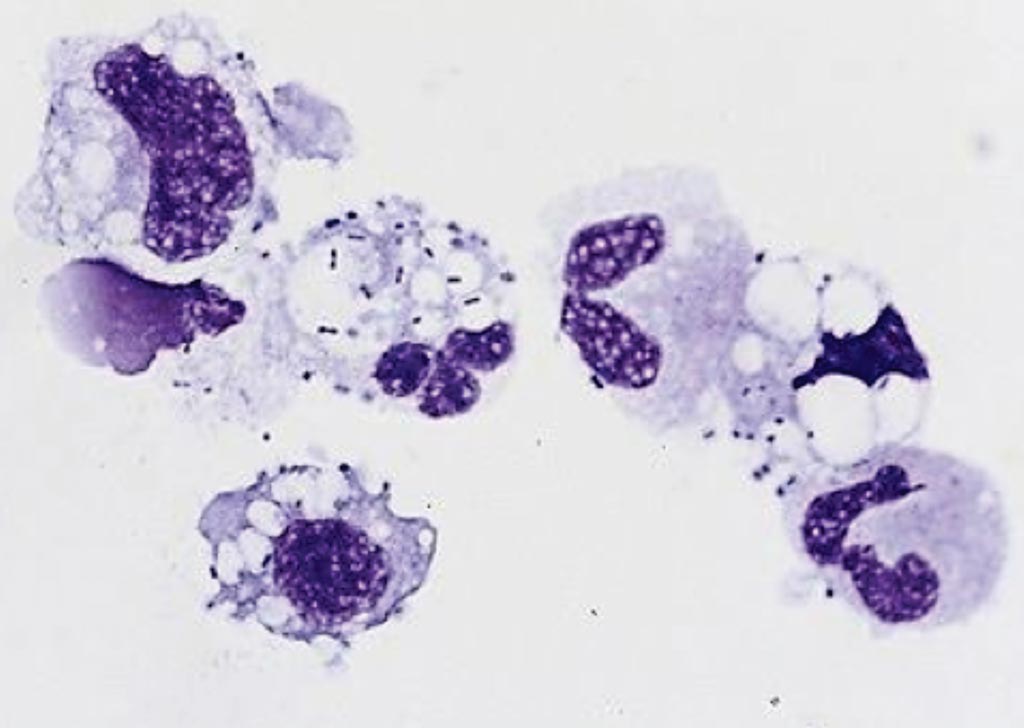Rising Diagnosis of Viral Meningitis Is Often Delayed
By LabMedica International staff writers
Posted on 11 Jul 2018
As the incidence of bacterial meningitis decreases, the proportion of meningitis cases caused by viruses is increasing and the use of molecular diagnostics has also led to increased recognition of neurological viral infections.Posted on 11 Jul 2018
Identification of the cause of meningitis is important to improve clinical care, including reducing unnecessary use of antibiotics and antivirals. Patients with suspected viral meningitis are often treated with antibiotics while a diagnosis of bacterial meningitis is excluded, which results in patients receiving long courses of antibiotics and can extend their hospital stay.

Image: A stained cerebrospinal fluid preparation from a case of acute bacterial (pneumococcal) meningitis. There are numerous neutrophils and bacteria (Photo courtesy of Dr. Edmund S. Cibas, MD).
A large team of scientists working with the University of Liverpool (Liverpool, UK) carried out a multicenter prospective observational cohort study of adults with suspected meningitis at 42 hospitals across England. The investigators enrolled 1,126 patients were enrolled between September 30, 2011, and September 30, 2014. There were 638 (57%) patients who had meningitis: 231 (36%) cases were viral, 99 (16%) were bacterial and 267 (42%) had an unknown cause. 41 (6%) cases had other causes.
The team identified cerebrospinal fluid (CSF) samples with a leucocyte count of more than 4 × 106 cells/L from laboratory records and classified them according to pathogen identified (or unknown if none was found). All CSF samples were examined by microscopy and culture. CSF polymerase chain reaction (PCR) was done in the admitting hospitals, regional diagnostic centers, or the University of Liverpool, to test for herpes simplex virus types 1 and 2, varicella zoster virus, and enteroviruses, as well as Streptococcus pneumoniae and Neisseria meningitidis, following national recommendations. They applied a proportional inflation, based on the total number of cases (those recruited and those missed) divided by the actual number recruited into the northwest sites in the prospective study, to the initial estimated northwest incidence data.
The team found that found that diagnosis of meningitis was often delayed due to unnecessary brain scans being performed before lumbar puncture, which is the essential investigation to determine the cause of the illness. The majority of patients (81%) had a brain scan and 70% of those took place before lumbar puncture, otherwise known as a spinal tap. Overall, the specific virus or bacteria causing the illness was not identified for 43% of patients.
The authors concluded that their findings demonstrated that viruses are the predominant cause of adult meningitis in the UK, with enteroviruses and herpesviruses responsible for the majority of cases for which a cause is found. Michael Griffiths, BMedSci, BMBS, DPhil, a senior clinical lecturer and a co-author of the study, said, “Diagnosing a specific cause of meningitis quickly is key to getting patients on the right antibiotics, if needed, or avoiding unnecessary antibiotics in those with viral meningitis. Once viral meningitis has been diagnosed, efforts should focus on treatment of the symptoms and expediting discharge from hospital, which would be less distressing for patients and ease pressures on the NHS. The study was published on June 29, 2018, in the journal The Lancet Infectious Diseases.
Related Links:
University of Liverpool














